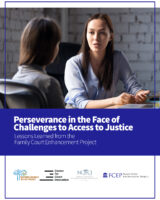Resources
The four sites engaged in a variety of activities and developed resources to improve outcomes for domestic violence survivors and their children. Some were unique to a particular site, such as Hennepin's pilot court and Multnomah's procedural fairness efforts, and several, such as training and help for self-represented survivors, occurred across all four sites, though often implemented differently. Below is a list of the activities and resources developed by the sites, with descriptions as well as materials and tools where available. If you have any questions or would like more information about any of these activities, please contact our team and we'll be happy to help.
Browse by location
Perseverance in the Face of Challenges to Access to Justice
A commitment to improve litigants’ access to justice emerged as a goal for all four FCEP sites. In seeking to improve the system, the teams at each site anticipated some challenges and were surprised by others. Here, we tell the story of challenges that confronted the sites and how they met and overcame them to increase access to justice for domestic violence survivors in their courts...
Domestic violence-informed processes for alternative dispute resolution (Hennepin)
Hennepin was concerned that domestic violence survivors were pressured into participating in alternative dispute resolution (ADR) processes that may not be safe and without full information about their options. After much discussion, they reformed the processes to include screening for domestic violence by attorneys and all ADR professionals and complete information for litigants about the processes and available safety modifications. They were also advised that they could opt out of ADR if a different process was more suitable for their case. A guidance document for attorneys and ADR professionals incorporates a screening tool and has been distributed to all practitioners and is available from the court. Judges also now read a script before referring a case to ADR that outlines available options and emphasizes that participation is voluntary...
Spreading the word about FCEP (Multnomah)
Multnomah County, OR,Safety and well-being,Access to justice,Due process,Collaboration,Community Outreach
Multnomah County has taken steps to increase the visibility of the Family Court Enhancement Project by making presentations about their activities and experiences at national and regional conferences. These materials provide an overview of the site’s work on the project...
Self-represented litigants: New staff and better written info (Cook)
Cook County, IL,Safety and well-being,Access to justice,Due process,Access to justice/self-represented litigants (SRLs)
Like courts across the country, Cook County experiences a high percentage of self-represented litigants, which presents unique challenges when domestic violence is present. The site developed materials to help victims and respondents better understand the process and their options. Also, the help desk did not have any bilingual staff. Cook County is a highly diverse community, and a significant portion of the court’s litigants have limited English proficiency. To meet this need, the court hired a bilingual help desk staff person to assist non-English speakers...
Parenting time in protection orders: Facilitation and supervised visitation (Cook)
Cook County, IL,Safety and well-being,Access to justice,Access to justice/self-represented litigants (SRLs),Child-related relief in protection orders
Cook County’s Domestic Violence Division is not a family court accustomed to making custody determinations, but instead a high-volume court hearing protection orders and domestic violence criminal matters. Finding time in busy court calendars to address all of the details involved in creating a parenting plan so that safe, effective child-related relief can be included in protection orders was therefore a challenge. Two innovations proved to be immensely helpful: a newly created position called the expediter, which operates in many ways as a domestic violence-informed mediator, and a supervised visitation liaison...
Self-represented litigants: Reform protection order process and better written information (Delaware)
Delaware,Safety and well-being,Access to justice,Due process,Accountability and transparency,Access to justice/self-represented litigants (SRLs)
Delaware made significant changes to its process for obtaining protection from abuse (PFA) orders. First, they redecorated the resource center to make the court environment more welcoming, used trauma-informed principles to reconfigure the space and process to increase privacy, and incorporated safety considerations. Next, Delaware developed a “core document” with information to help self-represented victims in PFA orders and custody matters. Using the core document, the site created one-page infographics, visually interesting and intuitive charts to address key questions that frequently arise in such cases, such as what a PFA order can do, differences between types of PFA orders, different aspects of custody, and how to tell whether Delaware has jurisdiction over child custody. Some of these were made into posters to display in the resource center and waiting areas. Delaware also created a packet of materials, in multiple languages, for PFA orders to assist self-represented litigants. Finally, a second hearing day was added to relieve congestion and allow matters to be heard more promptly, with on-site advocates and legal aid or volunteer attorneys available to offer legal assistance and support...
Training on custody and domestic violence, trauma, empathy, and other topics (Multnomah)
Multnomah County, OR,Safety and well-being,Access to justice,Due process,Accountability and transparency,Training
One challenge identified by Multnomah County was to improve the capacity of the court and court-related professionals to make informed recommendations and decisions regarding parenting time and custody in cases with domestic violence. Training for all family court practitioners was therefore a key activity. Programs were targeted for judges, court staff, custody evaluators, mediators, attorneys, advocates, therapists, and others, both as individual groups and in multidisciplinary presentations. Evaluations immediately following the programs were favorable, and anecdotal evidence indicates that participants are using the information from the trainings in their work. Additional data on the programs’ utility will be gathered in the next several months. Materials from several of the programs are below...




